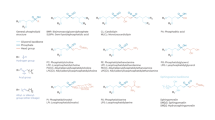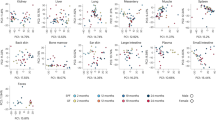Abstract
Background
Obesity is associated with development of insulin resistance in adipose tissue (AT). Human obesity has been associated with increased glycogen deposition in adipocytes. Adipocytes synthesise glycogen prior to the formation of lipids. The present study examined adipose glycogen content in obese Zucker rats and the effect of fasting on glycogen-metabolising enzymes. We hypothesised that obesity imposes a blunted response to fasting through impaired activation of glycogen-metabolizing enzymes, which dampens glycogen mobilization in obese Zucker rats.
Methods
We investigated the effect of 24h fasting on AT glycogen metabolism in 12-week old obese Zucker rats. Epididymal fat pads were collected from rats fed ad-libitum and fasted for 24h. Glycogen content, glycogen synthase and phosphorylase enzyme activity, and PKA activity were analysed as well as total and phosphorylated protein content for glycogen-metabolizing enzymes glycogen synthase and phosphorylase, glucose transporter GLUT4, and cAMP-dependent response element binding protein levels.
Results
Twelve-week old obese Zucker rats showed increased AT glycogen content (adipose glycogen content [mean ± SD], lean: 3.95 ± 2.78 to 0.75 + 0.69 µg.mg−1; p < 0.005 fed vs fasted, and obese: 5.23 ± 3.38 to 5.019 ± 1.99 µg.mg−1; p = ns fed and fasted and p < 0.005 lean vs obese), and impaired fasting-induced glycogen mobilization following a 24h fast. These defects were associated with dysfunctional glycogen-metabolizing enzymes, characterized by: (1) blunted phosphorylation-mediated activation and downregulated protein expression of glycogen phosphorylase, and (2) an impaired phosphorylation-mediated inactivation of glycogen synthase. Furthermore, these defects were related to impaired fasting-induced protein kinase A (PKA) activation.
Conclusion
This study provides evidence of a defective glycogen metabolism in the adipose associated with impaired fasting-induced activation of the upstream kinase protein kinase A, which render a converging point to obesity-related primary alterations in carbohydrate and lipid metabolism in the AT.
This is a preview of subscription content, access via your institution
Access options
Subscribe to this journal
Receive 12 print issues and online access
$259.00 per year
only $21.58 per issue
Buy this article
- Purchase on Springer Link
- Instant access to full article PDF
Prices may be subject to local taxes which are calculated during checkout





Similar content being viewed by others
Data availability
Information and data supporting the results of this investigation are included within the article and are available from the corresponding author on reasonable request.
References
Frayn KN, Humphreys SM. Metabolic characteristics of human subcutaneous abdominal adipose tissue after overnight fast. Am J Physiol Endocrinol Metab. 2012;302:E468–75.
Markan KR, Jurczak MJ, Allison MB, Ye H, Sutanto MM, Cohen RN, et al. Enhanced glycogen metabolism in adipose tissue decreases triglyceride mobilization. Am J Physiol Endocrinol Metab. 2010;299:E117–25.
Flatt JP, Ball EG. Studies on the Metabolism of Adipose Tissue. Xv. An Evaluation of the Major Pathways of Glucose Catabolism as Influenced by Insulin and Epinephrine. J Biol Chem. 1964;239:675–85.
Leonards JR, Landau BR. A study of the equivalence of metabolic patterns in rat adipose tissue: insulin versus glucose concentration. Arch Biochem Biophys. 1960;91:194–200.
Birsoy K, Soukas A, Torrens J, Ceccarini G, Montez J, Maffei M, et al. Cellular program controlling the recovery of adipose tissue mass: an in vivo imaging approach. Proc Natl Acad Sci USA. 2008;105:12985–90.
Eichner RD. Adipose tissue glycogen synthesis. Int J Biochem. 1984;16:257–61.
Jurczak MJ, Danos AM, Rehrmann VR, Allison MB, Greenberg CC, Brady MJ. Transgenic overexpression of protein targeting to glycogen markedly increases adipocytic glycogen storage in mice. Am J Physiol Endocrinol Metab. 2007;292:E952–63.
Kaslow HR, Mayer SE. Adaptations of glycogen metabolism in rat epididymal adipose tissue during fasting and refeeding. J Biol Chem. 1979;254:4678–83.
Ceperuelo-Mallafre V, Ejarque M, Serena C, Duran X, Montori-Grau M, Rodriguez MA, et al. Adipose tissue glycogen accumulation is associated with obesity-linked inflammation in humans. Mol Metab. 2016;5:5–18.
Lawrence JC Jr., James C, Hiken JF. Control of glycogen synthase by insulin and isoproterenol in rat adipocytes. Changes in the distribution of phosphate in the synthase subunit in response to insulin and beta-adrenergic receptor activation. J Biol Chem. 1986;261:669–77.
MacAulay K, Doble BW, Patel S, Hansotia T, Sinclair EM, Drucker DJ, et al. Glycogen synthase kinase 3alpha-specific regulation of murine hepatic glycogen metabolism. Cell Metab. 2007;6:329–37.
Printen JA, Brady MJ, Saltiel AR. PTG, a protein phosphatase 1-binding protein with a role in glycogen metabolism. Science. 1997;275:1475–8.
Van de Werve G, Sestoft L, Folke M, Kristensen LO. The onset of liver glycogen synthesis in fasted-refed rats. Eff streptozocin Diabetes Peripher Insul Replace Diabetes. 1984;33:944–9.
Greenberg CC, Jurczak MJ, Danos AM, Brady MJ. Glycogen branches out: new perspectives on the role of glycogen metabolism in the integration of metabolic pathways. Am J Physiol Endocrinol Metab. 2006;291:E1–8.
Roach PJ. Glycogen and its metabolism. Curr Mol Med. 2002;2:101–20.
Roach PJ, Depaoli-Roach AA, Hurley TD, Tagliabracci VS. Glycogen and its metabolism: some new developments and old themes. Biochem J. 2012;441:763–87.
Gutman A, Shafrir E. Metabolic influences on enzymes of glycogen synthesis and breakdown in adipose tissue. Am J Physiol. 1964;207:1215–20.
Thomas JA, Schlender KK, Larner J. A rapid filter paper assay for UDPglucose-glycogen glucosyltransferase, including an improved biosynthesis of UDP-14C-glucose. Anal Biochem. 1968;25:486–99.
Zhang T, Wang S, Lin Y, Xu W, Ye D, Xiong Y, et al. Acetylation negatively regulates glycogen phosphorylase by recruiting protein phosphatase 1. Cell Metab. 2012;15:75–87.
Vaughan M. Effect of hormones on phosphorylase activity in adipose tissue. J Biol Chem. 1960;235:3049–53.
Murphy RM, Xu H, Latchman H, Larkins NT, Gooley PR, Stapleton DI. Single fiber analyses of glycogen related proteins reveal their differential association with glycogen in rat skeletal muscle. Am J Physiol Cell Physiol. 2012;303:C1146–55.
Parker GJ, Koay A, Gilbert-Wilson R, Waddington LJ, Stapleton D. AMP-activated protein kinase does not associate with glycogen alpha-particles from rat liver. Biochem Biophys Res Commun. 2007;362:811–5.
Ros S, Garcia-Rocha M, Dominguez J, Ferrer JC, Guinovart JJ. Control of liver glycogen synthase activity and intracellular distribution by phosphorylation. J Biol Chem. 2009;284:6370–8.
Kienesberger PC, Lee D, Pulinilkunnil T, Brenner DS, Cai L, Magnes C, et al. Adipose triglyceride lipase deficiency causes tissue-specific changes in insulin signaling. J Biol Chem. 2009;284:30218–29.
Li RY, Song HD, Shi WJ, Hu SM, Yang YS, Tang JF, et al. Galanin inhibits leptin expression and secretion in rat adipose tissue and 3T3-L1 adipocytes. J Mol Endocrinol. 2004;33:11–9.
Aleixandre de Artinano A, Miguel Castro M. Experimental rat models to study the metabolic syndrome. Br J Nutr. 2009;102:1246–53.
Liu RH, Mizuta M, Kurose T, Matsukura S. Early events involved in the development of insulin resistance in Zucker fatty rat. Int J Obes Relat Metab Disord. 2002;26:318–26.
Corsetti JP, Sparks JD, Peterson RG, Smith RL, Sparks CE. Effect of dietary fat on the development of non-insulin dependent diabetes mellitus in obese Zucker diabetic fatty male and female rats. Atherosclerosis. 2000;148:231–41.
Lu Z, Wang Z, Wang X, Diao B, Feng X, He F, et al. Protection from high-fat-diet-induced impaired glucose tolerance in female Sprague-Dawley rats. Gynecol Endocrinol. 2009;25:464–71.
Unger RH. How obesity causes diabetes in Zucker diabetic fatty rats. Trends Endocrinol Metab. 1997;8:276–82.
Zucker LM. Fat mobilization in vitro and in vivo in the genetically obese Zucker rat “fatty”. J Lipid Res. 1972;13:234–43.
Bougneres P, Stunff CL, Pecqueur C, Pinglier E, Adnot P, Ricquier D. In vivo resistance of lipolysis to epinephrine. A new feature of childhood onset obesity. J Clin Invest. 1997;99:2568–73.
Enoksson S, Talbot M, Rife F, Tamborlane WV, Sherwin RS, Caprio S. Impaired in vivo stimulation of lipolysis in adipose tissue by selective beta2-adrenergic agonist in obese adolescent girls. Diabetes. 2000;49:2149–53.
Reynisdottir S, Wahrenberg H, Carlstrom K, Rossner S, Arner P. Catecholamine resistance in fat cells of women with upper-body obesity due to decreased expression of beta 2-adrenoceptors. Diabetologia. 1994;37:428–35.
Izumida Y, Yahagi N, Takeuchi Y, Nishi M, Shikama A, Takarada A, et al. Glycogen shortage during fasting triggers liver-brain-adipose neurocircuitry to facilitate fat utilization. Nat Commun. 2013;4:2316.
Pedersen O, Kahn CR, Kahn BB. Divergent regulation of the Glut 1 and Glut 4 glucose transporters in isolated adipocytes from Zucker rats. J Clin Invest. 1992;89:1964–73.
Dalen KT, Ulven SM, Bamberg K, Gustafsson JA, Nebb HI. Expression of the insulin-responsive glucose transporter GLUT4 in adipocytes is dependent on liver X receptor alpha. J Biol Chem. 2003;278:48283–91.
Garvey WT, Maianu L, Huecksteadt TP, Birnbaum MJ, Molina JM, Ciaraldi TP. Pretranslational suppression of a glucose transporter protein causes insulin resistance in adipocytes from patients with non-insulin-dependent diabetes mellitus and obesity. J Clin Invest. 1991;87:1072–81.
Kahn BB, Charron MJ, Lodish HF, Cushman SW, Flier JS. Differential regulation of two glucose transporters in adipose cells from diabetic and insulin-treated diabetic rats. J Clin Invest. 1989;84:404–11.
Weems JC, Griesel BA, Olson AL. Class II histone deacetylases downregulate GLUT4 transcription in response to increased cAMP signaling in cultured adipocytes and fasting mice. Diabetes. 2012;61:1404–14.
Ding Q, Gros R, Gray ID, Taussig R, Ferguson SS, Feldman RD. Raf kinase activation of adenylyl cyclases: isoform-selective regulation. Mol Pharmacol. 2004;66:921–8.
Gaidhu MP, Anthony NM, Patel P, Hawke TJ, Ceddia RB. Dysregulation of lipolysis and lipid metabolism in visceral and subcutaneous adipocytes by high-fat diet: role of ATGL, HSL, and AMPK. Am J Physiol Cell Physiol. 2010;298:C961–71.
Kalderon B, Azazmeh N, Azulay N, Vissler N, Valitsky M, Bar-Tana J. Suppression of adipose lipolysis by long-chain fatty acid analogs. J Lipid Res. 2012;53:868–78.
Zhang J, Hupfeld CJ, Taylor SS, Olefsky JM, Tsien RY. Insulin disrupts beta-adrenergic signalling to protein kinase A in adipocytes. Nature. 2005;437:569–73.
Reynisdottir S, Ellerfeldt K, Wahrenberg H, Lithell H, Arner P. Multiple lipolysis defects in the insulin resistance (metabolic) syndrome. J Clin Invest. 1994;93:2590–9.
Leonard BL, Watson RN, Loomes KM, Phillips AR, Cooper GJ. Insulin resistance in the Zucker diabetic fatty rat: a metabolic characterisation of obese and lean phenotypes. Acta Diabetol. 2005;42:162–70.
Delghandi MP, Johannessen M, Moens U. The cAMP signalling pathway activates CREB through PKA, p38 and MSK1 in NIH 3T3 cells. Cell Signal. 2005;17:1343–51.
Klemm DJ, Roesler WJ, Boras T, Colton LA, Felder K, Reusch JE. Insulin stimulates cAMP-response element binding protein activity in HepG2 and 3T3-L1 cell lines. J Biol Chem. 1998;273:917–23.
Cho IS, Jung M, Kwon KS, Moon E, Cho JH, Yoon KH, et al. Deregulation of CREB signaling pathway induced by chronic hyperglycemia downregulates NeuroD transcription. PLoS ONE. 2012;7:e34860.
Acknowledgements
The authors gratefully acknowledge professor Dr. Mark Hargreaves from the department of Physiology, faculty of Medicine, University of Melbourne, for his support and assistance throughout the project, and the review and comments provided during the preparation of this manuscript.
Funding
MFO was granted by the Becas Chile scholarship program of CONYCIT.
Author contributions
DS and MFO designed the study. MFO acquired data, analyzed/interpreted data, wrote and revised the manuscript. JT and TN conducted animal dissections. DS, DVI and HZF analyzed/interpreted data and reviewed the manuscript. All authors are fully responsible for all content and editorial decisions and were involved at all stages of manuscript development, and have approved the final version of the manuscript to be published.
Author information
Authors and Affiliations
Corresponding author
Ethics declarations
Conflict of interest
The authors declare that they have no conflict of interest.
Additional information
Publisher’s note: Springer Nature remains neutral with regard to jurisdictional claims in published maps and institutional affiliations.
Supplementary information
Rights and permissions
About this article
Cite this article
Flores-Opazo, M., Trieu, J., Naim, T. et al. Defective fasting-induced PKA activation impairs adipose tissue glycogen degradation in obese Zucker rats. Int J Obes 44, 500–509 (2020). https://doi.org/10.1038/s41366-019-0327-y
Received:
Revised:
Accepted:
Published:
Issue Date:
DOI: https://doi.org/10.1038/s41366-019-0327-y



